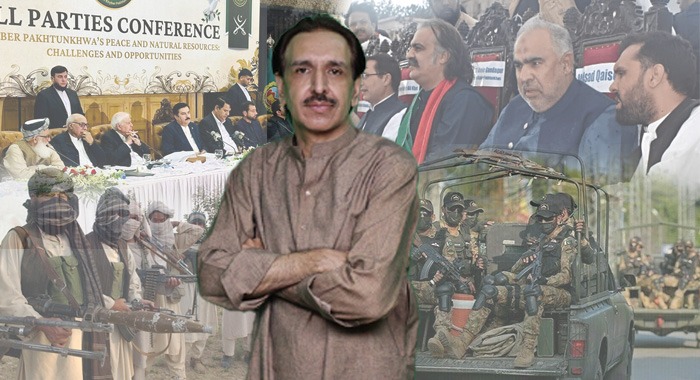The recent meeting of the Provincial Apex Committee in Khyber Pakhtunkhwa was presented as a high-level effort to unify the province’s leadership, security apparatus, and political forces against the rising tide of terrorism. On paper, such meetings are critical; in reality, they are being undermined by political point scoring, mistrust, and an alarming alignment of provincial politics with pro-Taliban narratives.
The first red flag was the absence of proper protocol. An Apex Committee is meant to include three pillars: the Governor as the federal representative, the Chief Minister as the provincial executive, and the Corps Commander representing the military establishment. Yet, the meeting held in Peshawar left glaring questions unanswered: Was the Governor, Faisal Karim Kundi, even invited? If he wasn’t, this was nothing more than a political tea party masquerading as a security session. If he was invited and chose not to attend, the dereliction is equally serious.
The video message released by Chief Minister Ali Amin Gandapur after the session further trivialised the gravity of the situation. A TikTok-style address to the public cannot capture the essence of a meeting meant to protect 40 million residents from a resurgent TTP. The CM’s public posturing, his constant resistance to military operations, and his insistence on jirgas as the ultimate solution have reduced the Apex Committee to a ceremonial exercise.
This pattern is dangerously familiar. A few hours before the committee met, the provincial government was busy holding its own internal meetings criticising federal authority, Article 245, and military operations. PTI’s provincial leadership has repeatedly accused the security establishment of “keeping good Taliban,” echoing narratives historically pushed by anti-state elements like the PTM or TTP sympathisers. Whether deliberate or naïve, these statements legitimise terrorist propaganda and weaken the state’s writ.
Meanwhile, the ground reality is stark: 16 districts in KP have witnessed terrorist attacks this month alone. In Tirah, Bajaur, and Bannu, operations have been conducted against entrenched TTP hideouts. And yet, what has the provincial government offered as an alternative? A circus of jirgas and all-parties conferences, which have become political theatre rather than counter-terrorism tools.
The so-called jirgas in Tirah and Bajaur illustrate the complete abdication of state authority. Local elders and political figures have met militants under the guise of negotiation, indirectly confirming the presence of TTP in those areas. When provincial leaders delay or resist operations and then send jirgas to beg for ceasefires, they are signaling to terrorists that the state is divided and hesitant. This emboldens the TTP and demoralises security forces who continue to bleed and sacrifice on the front-lines.
The body language in the Apex Committee meeting told its own story. Corps Commander Umar Bukhari’s discomfort was evident; the tension between provincial and military leadership was palpable. This is not the environment in which decisive anti-terror operations can be planned. As long as the provincial government indulges in *double-speak—cooperating in meetings while undermining operations publicly—*national security will remain compromised.
The reality is that Khyber Pakhtunkhwa is being treated as a bargaining chip in the political survival game of PTI and its allies. Two “leaders” dominate the provincial narrative today: Noor Wali Mehsud, the TTP chief sheltering in Kabul, and Imran Khan, currently jailed. The provincial government’s energy is focused on appeasing both constituencies, directly or indirectly, while ordinary citizens remain exposed to suicide attacks, targeted killings, and forced displacements.
If this path continues, we are moving towards de facto surrender of our tribal belt and southern districts to TTP influence, fulfilling the terrorists’ long-term goal of carving out a safe haven. Either the state asserts its writ fully and conducts uncompromising operations, or KP risks becoming ungovernable territory once again. There is no third option.
Political point scoring, jirga theatrics, and anti-state rhetoric will not protect Peshawar, Bannu, or Bajaur. Only decisive, unified, and unapologetic counter-terrorism policy can. The provincial leadership must decide if it stands with Pakistan or with those who seek to dismantle it from within.





